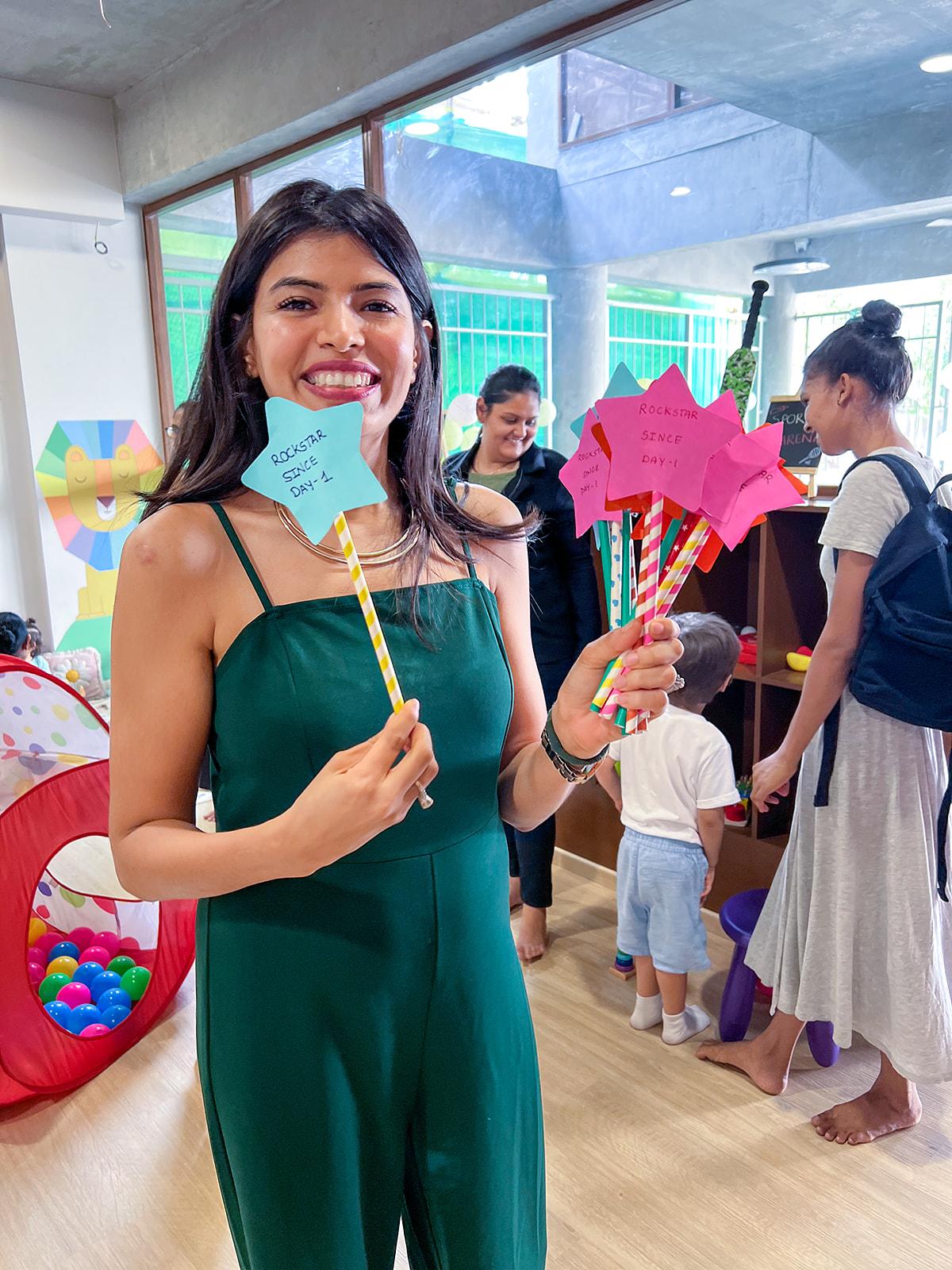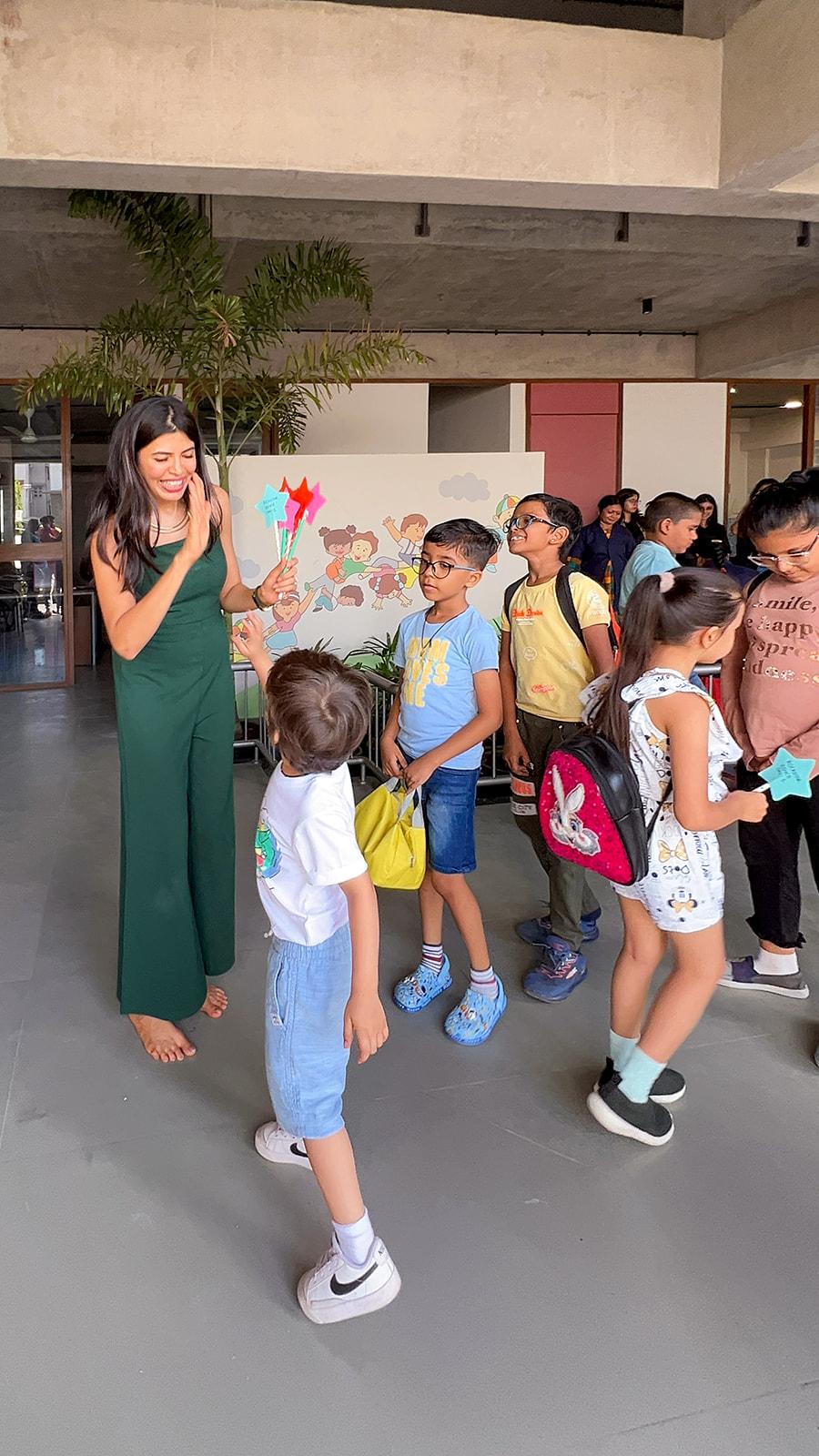Schweta Gandhi's insights into parenting and child development offer a profound understanding of early experiences and their lasting effects. Shweta emphasizes the importance of playtime over screen time, advocating for nurturing environments, healthy routines, and open communication. Her guidance empowers parents to confidently navigate parenting challenges, highlighting their evolving roles from emotional guides to mentors and friends, and underscoring the profound impact on a child's growth and well-being. As team mapabear discussed the need and importance of child development and psychology, through her expertise and experiences, Schweta encourages awareness, adaptation and above all, love in the journey of parenting.

Table of contents [Show]
-
Team mapa: What is child psychology? How do we explain it in very simple language to parents?
- When and how does early childhood development begin? How can parents start integrating these principles from infancy?
- So, if my daughter is not eating or showing tantrums, does distraction work well?
- How valuable are regular visits to both a child psychologist and a pediatrician?
-
How has our understanding and approach to child psychology evolved over the years?
- At what age should parents consider consulting a child psychologist?
- What are the key developmental milestones that parents should check from 0-5 years?
- How can parents recognize signs of developmental delays? Is there an age bracket for this?
-
How can parents promote healthy attachment and bonding with their infants and toddlers?
- How does early childhood trauma or stress impact a child’s development?
- Can you just tell me what is the memory of a child? For example, I don’t know if this ca n be a trauma; like- my daughter, when she was 10-months-old, she had a skull surgery, and she was diagnosed with craniosynostosis. Can such significant medical events in early childhood cause trauma even if the child doesn't remember it consciously?
- Can you discuss the importance of early language development and ways a parent can support language development?
- What role does playtime and exploration play in a child’s cognitive and social development during the early stages?
- How can parents encourage a healthy sleep routine with their child?
- Are there any specific nutrition guidelines that parents need to follow?
- Can you discuss the impact of screen time? How can it be moderated?
- What are some misconceptions that some parents have about child psychology? Have you encountered any misconceptions in your work?
- You also mentioned Happy Minds. Is it a school for parents or for children to attend?
- Shweta, Is it true that parenting evolves from discipline to friendship as children grow?
- How has your parenting journey been so far?
- Have your professional insights surprised you in your role as a mom? {
{
{
Team mapa: What is child psychology? How do we explain it in very simple language to parents?
Schweta Gandhi: Child psychology is essentially the study of a child's subconscious and conscious brain development across seven key areas. These include cognitive development, which involves their thinking processes, problem-solving, decision-making, and the ability to have ideas and presence of mind. Communication and language development follow, along with artistic and emotional intelligence growth. Then there's gross motor skills (large muscle activities), fine motor skills (small muscle coordination like pincer grasp and hand-eye coordination), and finally, spiritual development. For instance, teaching a child to say "I'm healing" instead of "I'm sick" instills a positive mindset. In summary, child psychology encompasses everything contributing to a child’s physical, mental, emotional, linguistic and spiritual growth.
Schweta: Subconscious mind training starts from the womb, with concepts like Garbhsanskar and prenatal classes emphasizing early development. Shweta highlights that parenting is more about the parents' actions and reactions than the child's behavior. In addition to this, she explains that every child will experience tantrums, emotional struggles, and power battles at different developmental milestones, which are natural and expected. Understanding that a child's prefrontal cortex, responsible for logical thinking, begins developing around 7-8 years og age and continues until 25 years of age which helps parents adjust their expectations and responses. Children lack impulse control and emotional regulation, so they can't always stop a tantrum even if they want to. This is because the parts of their brain that manage these functions are not yet fully developed. Shweta emphasizes that parents must connect with their child’s developmental stage and respond appropriately, fostering a nurturing environment rather than expecting adult-like logic from their children. By doing so, parents can better support their child's growth and emotional well-being.
So, if my daughter is not eating or showing tantrums, does distraction work well?
Schweta: Yes, distraction can often be effective in managing these situations. It's crucial to remember that children's prefrontal cortex, responsible for logical thinking, is still developing and continues to do so until around 25 years old. This means they may have limited impulse control and emotional regulation capabilities compared to adults. Therefore, even after explaining something to them, they may struggle to apply it, however having rules and having boundaries and consistency enforcing the rules and boundaries with connection will help parents navigate the tantrums smoothly!!
Understanding this can help parents approach tantrums with empathy and patience. It's essential not to view tantrums as intentional misbehavior but rather as a natural part of their developmental journey. By connecting with their child at their developmental stage, by having boundaries, by conveying these boundaries consistently, by empathizing with the child and offering gentle redirection or distractions, parents can help manage and de-escalate tantrums effectively. Consistency and Connection are key in supporting children as they learn to navigate their emotions and behaviors.
How valuable are regular visits to both a child psychologist and a pediatrician?
Schweta: Rather than regular visits to a child psychologist, I recommend parents invest in a good parenting program. Parenting is like starting a new company—you need a vision, values and training. Many parents, despite being successful in other areas, are unprepared for the demands of parenthood. A good program can help you provide the best version of yourself to your child, ensuring emotional stability and effective parenting strategies.

How has our understanding and approach to child psychology evolved over the years?
Shweta: I t's a tricky topic. In traditional Indian joint families, grandparents often have a strong influence which can sometimes undermine the parents. While grandparents are valuable as a support system, the primary parenting should be done by the parents. Aligning family values and parenting styles within the household creates a peaceful environment. Conflicting styles can confuse the child and frustrate the mother, negatively impacting the child’s development. Open, healthy communication and setting clear boundaries are crucial.
At what age should parents consider consulting a child psychologist?
Shweta: Insights from a child psychologist can be beneficial from the very beginning. Emotional health is as important as physical and mental health. A paediatrician cares for the child's physical health, a psychologist supports emotional and behavioral health, and a psychiatrist handles mental health. Parents should not neglect emotional health; its vital for the child's overall well-being.
What are the key developmental milestones that parents should check from 0-5 years?
Schweta: The primary milestones to watch for in child development are, walking by around one year and talking by two years. It's important to ensure your child has a healthy food intake and responds well to interactions, such as making eye contact and reacting to flashcards. It's also important to monitor if the child isn't constantly irritable or showing signs of distress. Some parents often live in denial about potential issues like borderline autism, even when coming from well-educated and affluent families. Early intervention is crucial, and parents should seek professional advice if they notice any red flags. I believe there is a need for awareness and open communication within the family, as it takes a supportive ecosystem to raise a child. As parents we need to manage our expectations with family members and communicate our needs clearly to avoid frustration and ensure the best support is available for a child's development.

How can parents recognize signs of developmental delays? Is there an age bracket for this?
Schweta: Signs of de velopmental delays can include a lack of response to interaction or not meeting basic developmental milestones like speech or motor skills. It's important to consult with a pediatrician if any concerns arise, who may then refer to a specialist if needed. While delays might not be apparent from 0-1.5 years, they become more noticeable once the child starts to talk post 15 months. Regular feedback from teachers of preschool on the child's social and academic interactions can also help identify potential i ssues early on.
Schweta: Healthy attachment involves being fully present when you are with your child and creating a trusted ecosystem when you are not. Establishing family rules and values like having meals together or limiting mobile phone use, reinforces a sense of stability and security. Consistent boundaries help children understand expectations, reducing power struggles and fostering a positive environment for bonding.
How does early childhood trauma or stress impact a child’s development?
Schweta: Oh, my God! It has a huge impact. So, where does stress start for children? The primary source of stress for children is not from social situations like friends, because they don't have such stress until they are around 5 years old. They don’t care much if a friend talks to them or not. They don't face work-related or self-esteem issues as adults do. For a child, the 'alpha' is the parent. The mother or father is the child's alpha. If anything happens involving this alpha figure, the child feels stressed. For example, if I don't talk to my son Agastya, if I scold him, or if I'm not paying attention to him, it stresses him out. Another stressor is if parents are fighting in front of the child—shouting or yelling. This not only affects them mentally but also physically because their nervous system is immature. Their behavior can change suddenly; they might become hyperactive or aggressive.
To avoid this, as parents, we need to maintain a peaceful environment at home. Even if parents have different opinions or parenting styles, they should not argue in front of the child. My husband Pranav and I often discuss our disagreements over text/call after going to our respective offices to avoid raising our voices at home. This way, the child gets an emotionally soothing environment, seeing the parents as a united team. This approach helps the child respect both parents and prevents power struggles where the child might otherwise favor one parent over the other.
Can you just tell me what is the memory of a child? For example, I don’t know if this ca n be a trauma; like- my daughter, when she was 10-months-old, she had a skull surgery, and she was diagnosed with craniosynostosis. Can such significant medical events in early childhood cause trauma even if the child doesn't remember it consciously?
Schweta: Children generally don't retain emotional memories from events before the age of 3. She explains that memories formed during this early stage are more factual and less intertwined with emotional responses. For instance, a child who undergoes skull surgery for craniosynostosis at 10 months old may remember the event later in life as a factual memory of having been through a procedure, but they are unlikely to recall the fear or discomfort they may have experienced at the time. Also, the emotional memory association typically begins around age 3, so early medical interventions like surgery are unlikely to cause lasting trauma in young children. Therefore, parents need not worry excessively about such experiences affecting their child's long-term emotional well-being.

Can you discuss the importance of early language development and ways a parent can support language development?
Schweta: Early language development is crucial. Many parents worry if their child is not speaking by 2 years old, but typically, by 2, a child should start speaking 2-3 word phrases. Initially, they will say single words like "mumma," "papa," then progress to two-word combinations like "mumma come," and eventually form sentences. To support this development, parents should consistently speak to their child clearly and repeatedly. Singing is particularly effective. For example, singing the alphabet song helps children learn faster than simply saying the letters. Emphasizing words and incorporating them into songs makes the learning process engaging and effective.
Schweta: Playtime is everything for kids. It's through play that children learn about the world and themselves. When a child is born, their brain is like a blank slate with only a few neural chains related to basic survival needs. As they grow and explore their environment, new neural chains develop, creating pathways that shape their personality and behavior. By age 2, a child can have around 2 million neural chains, indicating significant brain development. Positive reinforcement and a rich, stimulating environment contribute greatly to this process. Negative environments, however, can hinder development and cause long-term issues.
How can parents encourage a healthy sleep routine with their child?
Schweta: Children thrive on routine. A consistent schedule for eating, sleeping, and activities is very beneficial. For children aged 0-2 years, having a nighttime routine like bathing, followed by a soothing environment with cuddles and giggles, is ideal. Over-stimulation from screens or bright lights before bed can be detrimental, causing children to become hyperactive. It’s important to limit screen time and ensure the child winds down in a calm environment before sleeping.
Are there any specific nutrition guidelines that parents need to follow?
Schweta: While I’m not an expert in nutrition, basic guidelines include avoiding processed foods and opting for homemade meals. For example, if a child wants fries or pizza, it's better to make these at home using healthier ingredients. A balanced diet with vegetables, fruits, rice, nuts, seeds and whole grains is ideal. Occasional indulgence in outside food is okay, but maintaining a healthy diet overall is crucial for a child's physical and mental development.

Can you discuss the impact of screen time? How can it be moderated?
Schweta: Screen time can negatively impact emotional development by preventing children from developing problem-solving skills. They cannot translate bright 2d blocks seen on screen into actual 3d blocks in real life that they would play with. So educational content pertaining to language development can be used in moderation. Podcasts are a great way to substitute screen. Using screen time as a reward or punishment gives it undue importance. It's better to have a fixed, limited screen time without associating it with rewards or punishments. Co-watching educational content and avoiding overstimulating graphics can be beneficial. Until the age of Two, screen time is not generally recommended and after that, limited and mindful use is advisable. Please strictly avoid short, overly stimulating content like reels, youtube shorts or TikTok completely.
What are some misconceptions that some parents have about child psychology? Have you encountered any misconceptions in your work?
Schweta: Many parents underestimate the need for understanding child psychology, believing it unnecessary. I firmly believe that parenting is akin to any job—preparation is key. Just as you'd use GPS for a journey, parenting requires direction. Attending programs and setting family values helps create effective parenting strategies, like my mantra "connection before correction" and staying calm. Awareness enhances efficiency and emotional energy, leading to better child care.

You also mentioned Happy Minds. Is it a school for parents or for children to attend?
Schweta: Happy Minds offers a range of programs. We have early childhood education in the morning run by TVELC, public speaking at the Leadership Academy in the evening, and Neuro-Linguistic Programming sessions online. We also conduct worldwide Child Psychology and Parenting programs focusing on nurturing both parents and children.
Shweta, Is it true that parenting evolves from discipline to friendship as children grow?
Schweta: Absolutely. Initially, parents act as emotional guides, transitioning to coaches during the formative years. By age Five, becoming a trusted friend fosters open communication. Helicopter parenting may hinder this bond; trust and mutual respect are key. My son and I share nightly chats, encouraging him to discuss daily events openly. Providing positive attention minimizes tantrums, emphasizing that good parenting enhances a child's well-being. I refrain from scolding my child when he is having a meltdown. I rather take all the cues from the day and in the night when I’m putting him to sleep - when we’re connected, there’s no distraction - that’s when I’d do his emotional counseling - that’s exactly when i know that he is openly receiving the conversation- his logic brain is activated and he gets me. And it’s magical that I can see the gradual progress in his behaviour.
How has your parenting journey been so far?
Schweta: It's been incredibly rewarding. Despite challenges with two energetic children, I prioritize being present. Knowing how to stay calm and utilize effective parenting techniques is crucial. Without this knowledge, I'd be overwhelmed, but understanding child psychology enriches the experience.
Have your professional insights surprised you in your role as a mom?
Schweta: Immensely! Theoretical knowledge differs from practical experience. Instagram allows me to share practical tips that resonate with fellow parents. Balancing motherhood and career, I've always seen my children as enriching my life and professional growth. Even on my 11th day post-delivery, I was back at work, empowered by motherhood to spread my wings further.
Schweta Gandhi's journey through child psychology and parenting is not just a profession but a passion that enriches her every day. Her practical insights into nurturing children and fostering strong parent-child bonds highlight the transformative power of understanding and empathy. As she continues to empower parents worldwide through Happy Minds and her invaluable guidance, Schweta emphasizes that parenting is not just about raising children—it's about growing together with love, patience, and an unwavering commitment to their holistic well-being.





 Guiding and Empowering Parents with fact-checked excellence -
Guiding and Empowering Parents with fact-checked excellence -